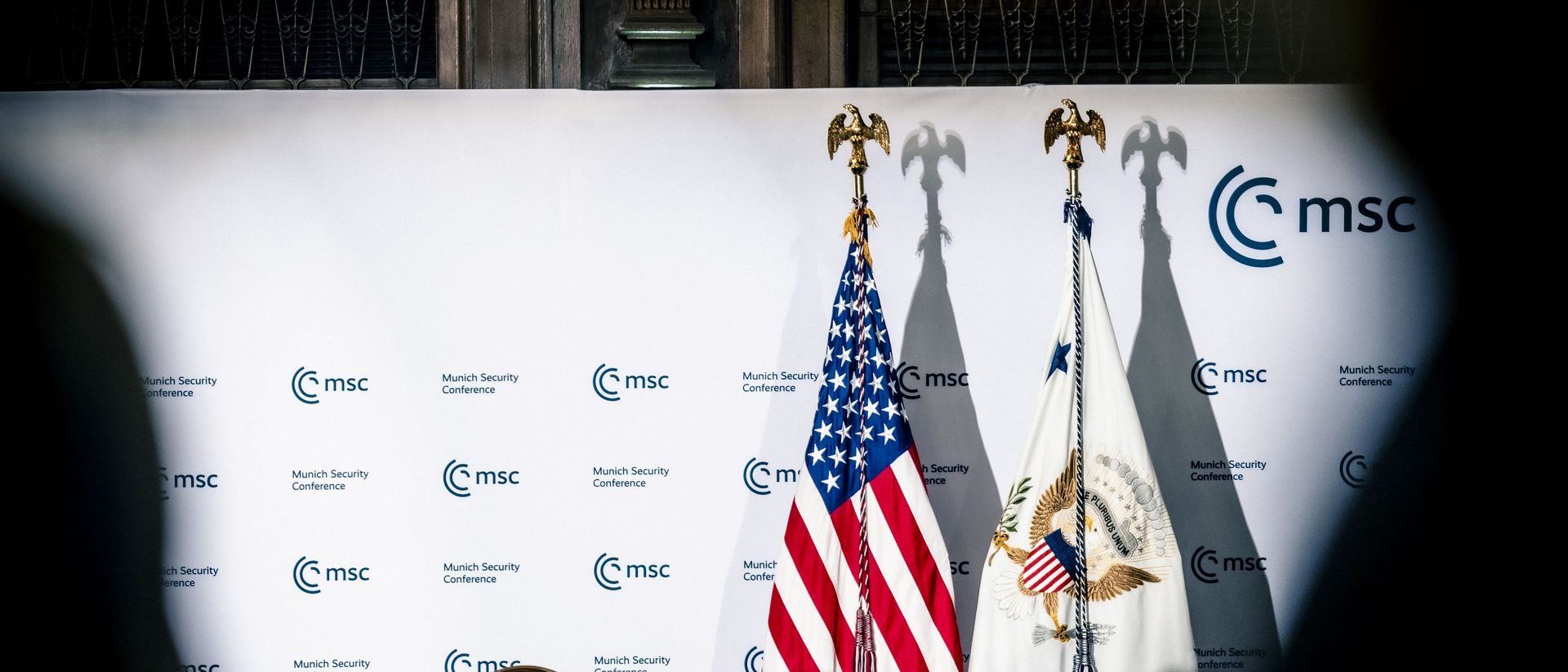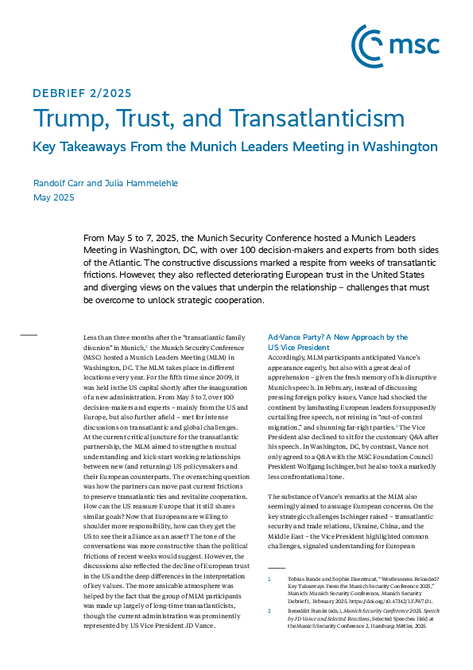

Trump, Trust, and Transatlanticism
Key Takeaways From the Munich Leaders Meeting in Washington
 AuthorRandolf Carr
AuthorRandolf Carr AuthorJulia Hammelehle
AuthorJulia Hammelehle
 AuthorRandolf Carr
AuthorRandolf Carr AuthorJulia Hammelehle
AuthorJulia Hammelehle
Key Points
At the Munich Leaders Meeting, decision-makers and experts from Europe and the US underlined the importance and benefits of strong transatlantic ties. US unilateralism and diverging views on supposed common values, however, have eroded trust. More engagement is a prerequisite to unlocking cooperation.
Europe has accepted that it must do more, and the US will do less for European security. However, questions remain about what US engagement will look like and how to manage the transition. The uncertainty of US commitment to Ukraine is a source of deep concern.
European and US leaders are far apart on trade. The lack of clarity around US aims and measures frustrates Europeans. Concerns that the US could weaponize dependencies cast doubt on cooperation in areas like technology and energy.
US unilateralism limits the potential for transatlantic cooperation on China. Perceived US power politics and disregard for international rules cause uncertainty not only in Europe but also in Asia, the Middle East, and beyond.
Less than three months after the “transatlantic family disunion” in Munich,[1] the Munich Security Conference (MSC) hosted a Munich Leaders Meeting (MLM) in Washington, DC. The MLM takes place in different locations every year. For the fifth time since 2009, it was held in the US capital shortly after the inauguration of a new administration. From May 5 to 7, over 100 decision-makers and experts – mainly from the US and Europe, but also further afield – met for intense discussions on transatlantic and global challenges. At the current critical juncture for the transatlantic partnership, the MLM aimed to strengthen mutual understanding and kick-start working relationships between new (and returning) US policymakers and their European counterparts. The overarching question was how the partners can move past current frictions to preserve transatlantic ties and revitalize cooperation. How can the US reassure Europe that it still shares similar goals? Now that Europeans are willing to shoulder more responsibility, how can they get the US to see their alliance as an asset? The tone of the conversations was more constructive than the political frictions of recent weeks would suggest. However, the discussions also reflected the decline of European trust in the US and the deep differences in the interpretation of key values. The more amicable atmosphere was helped by the fact that the group of MLM participants was made up largely of long-time transatlanticists, though the current administration was prominently represented by US Vice President JD Vance.
Ad-Vance Party? A New Approach by the US Vice President
Accordingly, MLM participants anticipated Vance’s appearance eagerly, but also with a great deal of apprehension – given the fresh memory of his disruptive Munich speech. In February, instead of discussing pressing foreign policy issues, Vance had shocked the continent by lambasting European leaders for supposedly curtailing free speech, not reining in “out-of-control migration,” and shunning far-right parties.[2] The Vice President also declined to sit for the customary Q&A after his speech. In Washington, DC, by contrast, Vance not only agreed to a Q&A with the MSC Foundation Council President Wolfgang Ischinger, but he also took a markedly less confrontational tone.
The substance of Vance’s remarks at the MLM also seemingly aimed to assuage European concerns. On the key strategic challenges Ischinger raised – transatlantic security and trade relations, Ukraine, China, and the Middle East – the Vice President highlighted common challenges, signaled understanding for European positions, and pointed out differences amicably. Vance reaffirmed his claim that the US and Europe “are still on the same team.” Nancy Pelosi, Member and former Speaker of the US House of Representatives, told an MLM read-out event hosted by Politico that she was “pleased” with Vance’s professed openness to the transatlantic relationship; other attendees were at least left “less nervous.”[3] Besides Pelosi, numerous American transatlanticists, including Senators Lindsey Graham, Amy Klobuchar, Jim Risch, Jeanne Shaheen, Sheldon Whitehouse, and House Representatives from both parties addressed MLM participants. Many stressed the need for strong transatlantic relations and their enduring commitment. To numerous participants, however, neither their nor Vance’s words could gloss over the US administration’s real adversarial actions and growing ideological rift with Europe.
Indeed, Vance did not back down from his disagreement with European leaders on fundamental values. He not only insinuated that Europe had gone too far in “policing the bounds of democratic speech,” but also brought up “civilizational team[s],” which invokes a far-right idea of a world divided along racial and cultural lines.[4] Instead of scolding his audience, though, he framed it as a dialogue: “We’re going to have to rethink a lot of big questions. But I do think that we should rethink those big questions together.” Given European concerns about the Trump administration’s infringement on fundamentals like the rule of law or the political independence of media, universities, and other institutions, such a “rethinking” will be contentious. Some MLM participants from both the US and Europe doubted that going “back to basics” – that is, pursuing common interests – is at all possible absent a solid sense of shared values.
A Lot to Deal With: Russia’s War on Ukraine and European Security
MLM discussions on European security and Russia’s war on Ukraine were largely constructive. US speakers consistently expressed support for Ukraine. During his Q&A, Vice President Vance criticized that, so far, Russia was “asking for too much” in its stated conditions for peace. For many observers, that acknowledgment marked a rhetorical step by the US administration towards shifting its pressure from Ukraine to Russia. The question of what US pressure on Russia could look like was top of mind for MLM participants. Some hailed the bipartisan sanctions bill introduced last month as formidable, but others doubted its chances of being implemented. Skeptics saw US President Donald Trump, with his sympathy for a “spheres of influence”–based world, as a potential roadblock to greater pressure on Russia or, down the road, security guarantees for Ukraine. There was concern that Trump, even with a minerals deal in hand, could still turn his back on Ukraine. It is unclear whether the US administration shares the view expressed by many participants that resisting Moscow’s designs on Ukraine is critical to US goals elsewhere, like deterring Chinese aggression in Asia.
Per Vance, the US was now more interested in shaping the contours of such a long-term settlement than a prompt ceasefire – a settlement that would need to be finalized in direct talks between Moscow and Kyiv. European participants highlighted that a durable settlement was paramount to contain renewed Russian aggression. Counter to a European-Ukrainian proposal a few days later, President Trump indeed demanded that Ukraine immediately take up Russia on its offer to hold direct talks without a prior ceasefire.[5]
There was consensus at the MLM that Europe needed to step up for Ukraine. But rather than debating security guarantees backed militarily by Europe or the US, MLM participants agreed that the immediate focus should be enabling a Ukrainian “porcupine strategy.” To that end, Europe should increase material support for Ukraine’s military and defense industry. Regarding financial support, a frequently raised point of criticism was the persisting hesitation to use frozen Russian assets for Ukraine’s benefit.
More broadly, too, the US message that it will do less, and that Europe must do more for its defense, had registered among MLM participants. Against the backdrop of the nearing NATO Summit, numerous European officials underlined increased defense spending and plans to go further. Across the board, however, participants agreed that “burden shifting” should be managed jointly. Only then could the US reduce its posture while Europe gradually “steps up” without exposing gaps in NATO’s deterrence. Participants cautioned that, even with no US troops or capabilities withdrawn from Europe yet, US reprimands towards Europe had already strained the credibility of NATO’s mutual security guarantee.
Trickling Away: Transatlantic Trade
In economic and trade relations, as in European security, participants widely shared concerns about US policies shifting from a rules-based to a power-based approach. US coercive trade policies threaten to weaken what is the world’s deepest trade and investment relationship. US contempt for rules-based multilateralism risks exacerbating the fragmentation of the global economic order and global trends of zero-sum thinking in trade and development, undermining mutual benefits of international cooperation.
At the MLM and sessions co-hosted with the Aspen Strategy Group (ASG), speakers repeatedly emphasized the unique economic fundamentals of the transatlantic partnership: Transatlantic trade in goods and services amounts to around two trillion US dollars; the US and Europe are each other’s top source and destination of trade and investment.[6] The potential to build on that and advance mutual economic benefits would be significant. Instead, concerns about mounting transatlantic trade frictions and the global fallout of President Trump’s tariff policies dominated the debate. While the MLM coincided with the announcement of US-China trade talks in Geneva and a UK-US trade agreement, participants questioned the scope of potential deals and US willingness to negotiate in good faith more broadly. They doubted that the worsening outlook for the US economy would lead to a significant course correction. “Ten percent globally is on,” one expert summarized the administration’s tariff policies. Pointing to the inconsistencies in the goals and instruments, some speakers argued that not economic facts, but an ideological sentiment of unfair treatment of the US and deep aversion to global economic integration drive US trade policies.
This is also visible in the US approach vis-à-vis international economic institutions. Participants expressed concerns that a further US retreat from the World Trade Organization (WTO) would add to the erosion of rules-based trade and its primary institution. The global economic costs would be immense.[7] And as one European official stressed, US neglect of the WTO would be a missed chance to build on the joint work within the organization aimed at adapting tariff and subsidy rules. At a development finance roundtable, co-hosted with the Council on Foreign Relations, participants welcomed the moderate tone of US Treasury Secretary Bessent at the spring meetings of the International Monetary Fund (IMF) and World Bank two weeks before the MLM. Yet, still expecting a US retreat, speakers were concerned about a weakening of the IMF’s ability to respond to financial crises. Further, a reduction in resources for the World Bank, on top of significant G7 cuts in development finance, would add more economic strain on low- and middle-income countries.
In addition to the expected economic costs and global welfare losses, participants highlighted the political knock-on effects of Trump’s economic policies. Concerns about a weaponization of dependencies erode political trust and limit the potential for transatlantic cooperation – despite mutual economic and geopolitical benefits. The MLM roundtables on technology and energy security were instructive in this regard. In both policy areas, speakers stressed that Europe and the US share common challenges and could profit from exploiting synergies. The benefits of cooperation would far outweigh disagreements, including on regulatory issues such as carbon pricing in energy or content moderation in tech. On tech, US participants stressed the need for transatlantic cooperation on developing AI and securing high-tech supply chains in competing with China. Yet, given growing concerns among European policymakers and businesses about a possible weaponization of existing tech ties by the US, the discussion echoed the need for a European de-risking strategy. On energy, speakers highlighted the key role of US liquid natural gas imports in replacing Russian gas flows to Europe. Transatlantic cooperation on clean tech and critical mineral supply chains, for example joint initiatives with resource-rich countries, would also be key in reducing the shared dependence on China.[8] Again, however, several participants highlighted that US unilateralism and European fears of becoming a target of US economic coercion are undermining the shared economic and geopolitical benefits of deeper transatlantic cooperation.
Together or Alone? The US and Europe Facing China
This tension also came up in the MLM and ASG sessions on China. In his remarks at the Q&A with Wolfgang Ischinger, Vice President Vance seemed to suggest the US and Europe should jointly work to “rebalance the global economy vis-à-vis China.” Yet, as participants pointed out, the aggressive US trade policies and threats of economic coercion are both pushing European and international partners away from Washington and supporting those voices arguing for a rapprochement with Beijing.
On the economic front, parts of the US administration at least rhetorically expressed a certain appreciation of the benefits of transatlantic coordination. However, some experts at the MLM shared the impression that this was changing in the security and defense realm. They argued that some voices in the US government were calling for a “US alone” approach in the Indo-Pacific, rejecting a greater presence of European forces. This would contrast with the previous administration’s efforts to address China as a common security challenge in NATO strategies and to see the Euro-Atlantic and Indo-Pacific as integrated theaters. One speaker strongly warned that splitting the theaters again could add to the disintegration of the Alliance.
Broadly, participants expressed uncertainty about the future direction and priorities of the US China policy. Given President Trump’s preference for uni- and bilateralism, questions also arose regarding the durability of regional multilateral initiatives and US support for its Asian partners. As in Europe, the reliability of US security assistance is in question in Asia, too. Signals from government officials had been mixed, with some seemingly favoring a “grand bargain,” including on the future of Taiwan, and others sticking to the narrative of China as a “pacing challenge” and key systemic rival. At the MLM, statements by US representatives tended toward the latter, suggesting a continuation of a confrontational course – economically and militarily.
Reset or Setback? Prospects for the Middle East
Uncertainty about future US foreign policies extended to other regions, including the Middle East. Just days before President Trump’s trip to the Gulf, the MSC’s Middle East Consultation Group convened off-the-record meetings as part of the MLM, bringing together members of the group, high-level policymakers and experts from the region, with US officials and senior experts. Discussions covered the recent developments in the Middle East and unfolding US policies and priorities, including in the Israeli-Palestinian conflict and US-Iran negotiations. Unpredictability in Trump’s Iran approach and tensions within the administration remain.[9] But a few days before the fourth round of US talks with Tehran, remarks by Vice President Vance and other officials at the MLM supported the public impression of a certain diplomatic momentum.
The need to build on and support political momentum was also the focal point of the conversations on Syria, including in a speech by Hind Kabawat, Minister for Labor and Social Affairs and the only female cabinet member in the new Syrian transitional government. Taking place at the National Archives – the repository of the US’s founding documents, including the Declaration of Independence, the Constitution, and the Bill of Rights – the speech was a powerful symbol of how the fundamental values enshrined in these charters continue to inspire.
Transatlantic Trust Exercise
In the presence of these documents, however, one was also reminded of the growing gulf in the interpretation of democratic values between the transatlantic partners. This eroding common value base will complicate cooperation on the many challenges Europe and the US share. Further, as summarized by several European MLM participants, joint transatlantic approaches are suffering from an increasing lack of trust in the reliability of the US. At a time when historical transatlantic affinities cannot be counted on to sustain practical cooperation, it is essential to invest more in building bridges and strengthening trust. With the opening of a new office in Washington, DC – inaugurated on the margins of the MLM – the MSC hopes to contribute to this.

Trump, Trust, and Transatlanticism: Key Takeaways From the Munich Leaders Meeting in Washington
Randolf Carr and Julia Hammelehle, “Trump, Trust, and Transatlanticism: Key Takeaways From the Munich Leaders Meeting in Washington,” Munich: Munich Security Conference, Munich Security Debrief 2, May 2025, https://doi.org/10.47342/WLSC7828.
Download PDF 127 KB- [1] Tobias Bunde and Sophie Eisentraut, “Westlessness Reloaded? Key Takeaways From the Munich Security Conference 2025,” Munich: Munich Security Conference, Munich Security Debrief 1, February 2025, doi.org/10.47342/LFJW7131.
- [2] Benedikt Franke (eds.), Munich Security Conference 2025. Speech by JD Vance and Selected Reactions, Selected Speeches Held at the Munich Security Conference 2, Hamburg: Mittler, 2025.
- [3] Nancy Pelosi, “Pelosi Says She Was ‘Pleased’ With Everything Vance Said in His MLM Remarks,” Politico, May 7, 2025; Felicia Schwartz and Robbie Gramer, “Vance Says Russia ‘Asking for Too Much’ to End War With Ukraine,” Politico, May 7, 2025.
- [4] Tal Axelrod, “Inside MAGA’s Fight for ‘Western Civilization’,” Axios, May 11, 2025.
- [5] Andrew E. Kramer, “Diplomatic Brinkmanship as Zelensky and Putin Spar Over Direct Talks on Ukraine,” The New York Times, May 11, 2025.
- [6] Daniel S. Hamilton and Joseph P. Quinlan, “The Transatlantic Economy 2025,” Washington, DC: Foreign Policy Institute, John Hopkins University SAIS/Transatlantic Leadership Network, 2025, perma.cc/W63J-JBAW.
- [7] Nora Kürzdörfer and Leonard Schütte, “Beyond Lose-Lose: Europe and the Global South in the Age of Geoeconomics,” Munich: Munich Security Conference, Munich Security Analysis 2, April 2025, doi.org/10.47342/WPCD1222.
- [8] Julia Hammelehle, “Climate: Heated Atmosphere,” in: Tobias Bunde/Sophie Eisentraut/Leonard Schütte (eds.), Munich Security Report 2024: Lose-Lose?, Munich: Munich Security Conference, February 2024, 87–93, doi.org/10.47342/BMQK9457, 91.
- [9] Brian Katulis, “Three Issues to Watch in Trump’s Emerging Iran Policy Approach,” Washington, DC: Middle East Institute, April 16, 2025, perma.cc/TM9U-ZA4F.